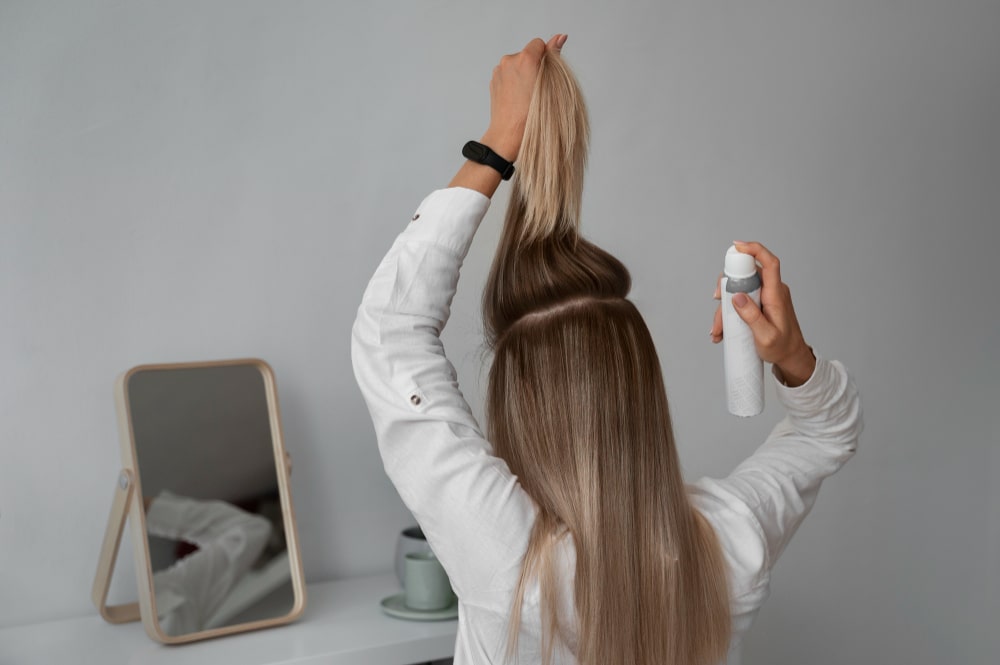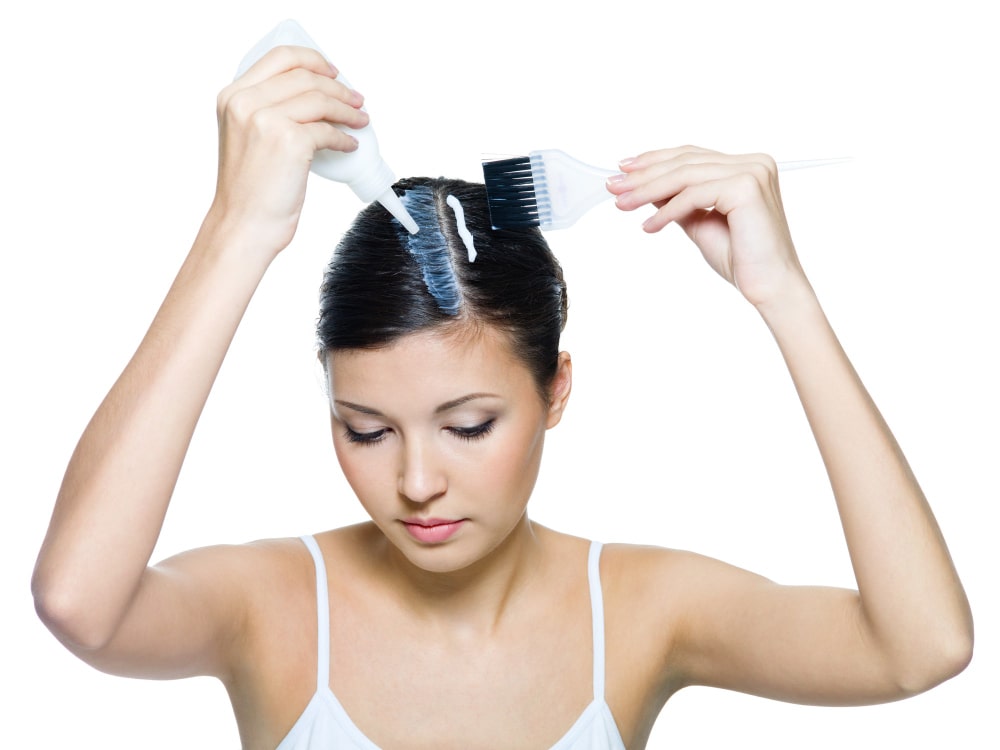Hair dye is a popular way to change your hair color and can be used professionally and at home. But have you ever wondered if coloring your hair could negatively affect its health? Hair loss, particularly when caused by certain chemicals, has been a hot topic regarding how safe hair dyes are. This article explores the potential link between hair dye and hair loss, can hair dye cause hair loss, including the historical controversies, scientific research, and possible mechanisms that could lead to baldness. We’ll also discuss tips for safe hair dyeing and other factors influencing hair health.
Understanding Hair Dye
Before delving into the topic of hair loss related to hair dye use, it is important to understand what hair dye is and how it works.
1. Types of Hair Dye
Hair dye is a type of cosmetic that is used to permanently or temporarily color the hair. It comes in two main forms: natural and synthetic. Natural hair dyes are typically derived from plant or animal sources, while synthetic dyes are derived from chemicals.
2. How Hair Dye Works?
Hair dyes work by altering the color of the pigments in the hair shaft. These pigments, called melanin, absorb light and color the hair. When natural or synthetic dyes are applied to the hair, they enter into these pigment cells and bind to them, changing the light absorption and giving the hair a new hue.
3. Common Ingredients in Hair Dye
The most common ingredients found in synthetic hair dyes are ammonia, hydrogen peroxide, parabens, and PPD (para-phenylenediamine). Ammonia helps open up the cuticles on your hair, allowing the dye to penetrate more deeply. Hydrogen peroxide helps oxidize and lighten the hair color, while parabens and PPD help bind the dye molecules to the hair shaft.

Read More: Shampoos That Cause Hair Loss in 2023: A Comprehensive Guide
Hair Loss: Causes and Types
Now that we’ve discussed what hair dye is and how it works let’s look at hair loss and its causes.
Normal Hair Growth Cycle
Hair grows in cycles, each lasting around two to six years. During the growth phase, new hairs are produced, and existing hairs grow longer. After this period of growth, the hair enters into a resting phase, when it stops growing for a few months before shedding.
Common Causes of Hair Loss
Hair loss can have many causes, including genetics, stress, diet and nutrition, certain medications, and even age. In some cases, excessive use of hair products like dyes or heat styling tools may also contribute to thinning hair.
Types of Hair Loss
Hair loss can come in different forms. The most common type is known as androgenic alopecia or male-pattern baldness. In this condition, hair thins out gradually in a predictable pattern. Other types of hair loss include telogen effluvium, where the hair falls out suddenly due to illness or stress, and alopecia areata, a condition characterized by patches of baldness on the scalp.
Read More: Scalp Yeast Infection: Causes, Symptoms, Treatment
Hair Dye and Hair Loss: The Controversy
Due to the various potential risks associated with hair dye use, there has been much debate over whether or not it can Hair Dye Cause Hair Loss. Let’s look at some of the historical concerns, current research findings, and factors contributing to the ongoing controversy.
Historical Concerns
The use of hair dye has been linked to hair loss since ancient times, and it is a valid concern that using hair dye could cause hair loss. Certain traditional recipes for hair dyes include toxic substances such as lead or arsenic, which could potentially cause skin irritation and even result in baldness if used too often.
Scientific Studies and Findings
Despite the historical concerns, few scientific studies have confirmed a direct link between hair dye and hair loss. Some studies suggest that hair dyes may help reduce the risk of thinning hair by improving blood circulation in the scalp.
Factors Contributing to the Controversy
The potential link between hair dye and hair loss is still largely inconclusive, though there is some evidence to suggest that it can indeed Hair Dye Cause Hair Loss in certain people. One of the factors contributing to this controversy is that some people may be more sensitive to the chemicals found in certain types of hair dye, making them more susceptible to scalp irritation or allergic reactions, which could result in temporary or permanent baldness.
Read More: Does Alcohol Cause Hair Loss: Everything You Need to Know
Chemical Damage to Hair
It is important to note that hair dye, like any chemical-based product, can cause damage if not used correctly. This type of damage is often referred to as “chemical calp,” it occurs when the chemicals in the dye penetrate too deeply into the hair shaft and weaken its structure. Symptoms of this damage may include brittle hair, split ends, and loss of shine.
Tips for Safe Hair Dyeing
To ensure your hair remains healthy while coloring it, here are a few tips you should follow:
- Read the instructions before using any hair dye, and make sure to follow them properly
- Wear gloves when applying the dye to protect your skin
- If using a synthetic hair dye, opt for one that is ammonia-free
- Use a deep conditioning treatment once a week for extra protection
- Avoid over-dyeing, as this can affect the health of your hair
Read More: Does Lupus Cause Hair Loss? Everything You Need To Know
Potential Mechanisms of Hair Dye Cause Hair Loss

Chemical Irritation and Allergies
One possible mechanism of hair dye-related hair loss is chemical irritation or allergies. Chemicals found in some types of hair dyes, such as ammonia and PPD, can irritate the scalp and cause inflammation, which can lead to thinning hair. Allergies to these chemicals have also been reported in some cases.
Excessive Heat
Applying too much heat to the hair when dyeing it can also lead to hair loss. The high temperatures used during the dyeing process can weaken the follicles and cause them to break, resulting in thinning hair.
Hormonal Imbalance
Hair dyes may also affect hormone levels, which in turn can disrupt the normal hair growth cycle. This could lead to thinning hair or even permanent baldness if left unchecked.
Precautions and Tips for Safe Hair Dyeing
To ensure your hair remains healthy while coloring it, here are a few precautions and tips you should follow:
- Avoid using home dyes as they may contain harsh chemicals that could cause scalp irritation or allergic reactions.
- Always wear gloves when handling any hair dye product.
- Before applying the dye, do an allergy test on a small section of your skin.
- If using a synthetic hair dye, opt for one that is ammonia-free, as this will reduce the risk of scalp irritation.
- Avoid using excessive heat when styling or drying your hair after dyeing it.
- Use a deep conditioning treatment once a week for extra protection and moisture.
- Lastly, avoid over-dyeing, as this can cause serious damage to your hair and even result in permanent baldness.
Read More: Can Dry Scalp Cause Hair Loss? Everything You Need to Know
Other Factors Influencing Hair Health
1) Diet and Nutrition
Your diet and nutrition play a huge role in the health of your hair. Eating foods rich in vitamins, minerals, proteins, and other nutrients can help keep your hair strong and healthy.
2) Stress Levels
Stress is another major factor when it comes to hair health. When you’re feeling stressed out or anxious, it can impact your hair and even lead to hair loss. To prevent this, it’s important to manage your stress levels through activities like exercise, yoga, meditation, or talking with friends.
3) Medications
Certain medications have also been linked to hair loss. If you are taking any medication and noticing changes in your hair, it’s best to talk to your doctor or healthcare provider. They can review the medications you are taking and advise on managing any potential side effects.
4) Genetics
Finally, genetics are also a factor when it comes to hair health. People with a family history of thinning hair or baldness may be more susceptible to hair loss than others.
Read More: Can Low Vitamin D Cause Hair Loss? How to Maintain Level
Professional Advice and Consultation
Seeking a Dermatologist’s Opinion
If you’re worried about hair loss or have any other concerns related to your hair, it’s best to consult with a dermatologist. Dermatologists are trained professionals who specialize in diagnosing and treating skin-related issues, including those related to hair health. With their help, you can determine if there is anything wrong with your scalp or if hair dye could be causing your hair loss.
Going to a Hair Professional
You can also visit a hair professional for advice on using hair dyes safely and avoiding scalp irritation or allergic reactions. A good stylist will be knowledgeable about the products they are using and can provide tips on how to dye your hair without damaging it in the process.
Treatment Options for Hair Loss
If you are experiencing hair loss, several treatments are available to help encourage regrowth. These include topical treatments like minoxidil, laser therapy, and medications like finasteride. It’s best to consult with a healthcare professional before taking medication or starting treatment.
Read More: Can Wearing a Hat Cause Hair Loss: Everything You Need to Know
Conclusion
In conclusion, while hair dye can be a great way to express yourself and change up your look, it is important to use caution when applying it, as there are potential risks associated with using hair dye that may cause hair loss. Taking steps such as wearing gloves, avoiding excessive heat, and using an ammonia-free synthetic dye may help reduce the risk of scalp irritation or allergic reactions that can lead to hair loss. Additionally, dietary changes, stress management techniques, seeking professional advice, and exploring treatment options can all help promote healthy hair growth and prevent the potential hair loss caused by using hair dye. By taking these steps, you can make sure your hair stays looking its best for years to come.
FAQs
It is generally not recommended to dye your hair while you are experiencing hair loss. This is because the chemicals in the dye can irritate the scalp and further damage weakened follicles, leading to more hair loss. If you choose to dye your hair, following all instructions carefully and taking extra precautions, such as wearing gloves and avoiding excessive heat, is important. Additionally, it’s best to consult with a healthcare professional before proceeding.
Natural hair dyes are generally considered safer than chemical ones as they contain fewer harsh ingredients. However, this doesn’t mean natural dyes are safe or free from potential side effects. It’s important to do an allergy test on a small skin patch before applying any dye to your scalp and avoid over-dyeing, as this can cause permanent damage.
Hair dyes are not believed to cause baldness directly, but they can contribute to it in some cases. If the scalp is irritated or weakened by harsh chemicals, it can lead to thinning hair and even permanent baldness if left unchecked. To reduce this risk, take extra precautions when applying dyes and avoid over-dyeing. Additionally, it’s important to monitor any changes in your hair growth or texture and consult with a healthcare professional if you are concerned.
If you choose to dye your hair, it’s best to avoid over-dyeing as this can cause permanent damage. Generally, it’s recommended to wait at least 4-6 weeks between each dye job and use extra caution when doing so. Additionally, a deep conditioning treatment once a week can help keep the hair hydrated and minimize damage from chemicals or heat.

